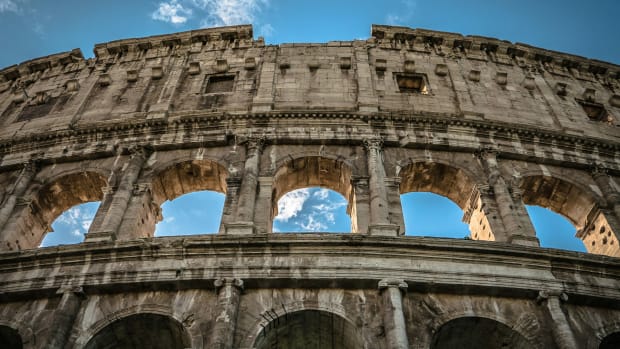
Living in the former Roman Empire? Then you’re happier, say UvA researchers
The Roman Empire lives on not only in men’s minds, but also in people’s health and happiness in life, statistical research shows. The Roman road network is thought to have played a role in this.
Are you reading this article in Amsterdam? Then, unfortunately, you are not among the lucky ones. Because cities like Katwijk, Nijmegen and Cologne that lie on former Roman territory appear today – however small the difference – to have measurably healthier and happier inhabitants than other places.
That conclusion is drawn by an international team of historians, psychologists and economists based on statistical research on 70,000 personality tests in the Netherlands and Germany. Six questions to lead researcher and UvA professor of psychology Martin Obschonka.
That the Roman Empire still has a psychological influence on people today sounds like a very strong story. How did you prove that?
“The idea that the Roman Empire lives on in society today is not new. There are piles of economic and anthropological studies that show that cultural and economic traits are deeply embedded in regions. The legacy of the ancient Roman Empire in the form of infrastructure and economic activity still lives on in society today.”

“What is new about our research is that we have now also measured the impact today’s populations. We actually came upon it by accident, while making psychological maps for different countries. We made those maps based on personality tests that people filled out. On the map of Germany I saw something remarkable, for neurotic tendencies – that sounds more extreme than it is, it means that people are more prone to worry and more susceptible to stress – we saw a very clear line between Cologne and Munich. Later I realized: that line runs exactly across the limes, the border zone of the ancient Roman empire. I then called in Fabian Wahl, a historian from Vienna who specializes in Roman history, and that’s how the research started.”
What do personality traits and health and happiness have to do with each other?
“We know that happiness and health on the one side, and personality on the other correlate. Conscientious people often show healthier behavior, so conscientiousness is what we in psychology call the “health trait”. It is also true that extraverted people – on average – are happier and more satisfied with their life.”
“Personality traits vary by region and can create a local psychological climate, which in turn can influence people visiting the region.”
But people move again, don’t they? Surely the psychological climate of the Romans doesn’t work for two thousand years?
“It does look like that. We cannot prove a hundred percent causality, but the strongest evidence we have is the limes itself. This allowed us to compare areas with and without Roman influence.”
“We looked at the personality traits of people in Germany and it is striking that people living in the former Roman Empire are healthier and happier and have a higher life expectancy than people in the areas outside. We see the same thing in the Netherlands along the limes border.”
“We looked at whether we could also explain that effect by more recent events such as the division of East and West Germany after World War II or the plague. Or other influences such as climate, landscape or soil fertility. These can all affect living standards. But despite those influences, we see a surprising statistical effect which we call the Roman effect, we have no other explanation for it.”
How did the Romans make the population happier?
“The Romans built a very strong road system that connected the entire Empire. Those roads meant trade and economic progress. The cities in the Roman Empire benefited and became prosperous earlier than the surrounding areas. And prosperous cities lead to happier residents.”
“In addition, health and happiness were a high priority for the Romans. A well-known Roman saying is not by coincidence “a healthy mind in a healthy body”. The way the Romans organized society had a lot of focus on that. Consider the major achievements in sanitation, nutrition, and medical advancements that the Romans also introduced to the former Roman regions of present-day Germany and the Netherlands.”
Why did you look at the Roman Empire? And not the Ottoman Empire, for example?
“We also look at other major events such as the Industrial Revolution and the gold rush that transformed America. The latter period may still explains why Silicon Valley is so successful. But the Roman Empire, of all those influences, still seems to have a more fundamental and deeper impact.”
Should everyone move to Nijmegen now?
“Probably not, haha. You shouldn’t see it too black and white either: there is not only a Roman effect, it is much more of a patchwork. In the Netherlands, historical developments like the international trade in major harbor cities also play a big role in the economic and cultural development of regions, for example for cities like Amsterdam and Rotterdam. And happiness also depends on your own choices in life. But it is good to be aware that places have a history and that there are places that make you happier than others. What we can probably learn from the Romans is openness to new ideas and connection with other places. That can be healthy in these times of borders, polarization and us and them thinking.”


